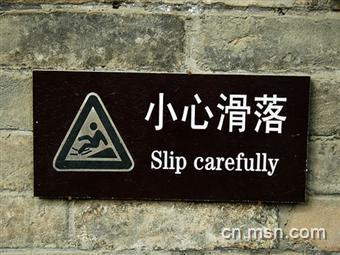本文由在线英语培训机构【一线口语】整理编辑
在各个英语学习论坛上,经常可以看到有关,但一般都是中国人写的。不过我看到过一篇长文,也是有关Chinglish的,但却是美国人写的,很有意思。这篇长文的标题是Chinglish2 English(从中式英语到标准英语),作者是浙江大学的美国外教Chuck Allanson,内容则是Chuck在中国五年任教期间所听到、所看到的各种 Chinglish 说法。
比如Chuck回忆他第一次来中国时,下飞机后,负责接待他的东北某大学英语系陈老师说:您刚到,我们吃点饭吧。我们要点Chinese dumpling (饺子)和Chinese beancurd(豆腐),您看可以吗?Chuck以前从未听说过这两种东西,但出于好奇,就说可以,结果饭菜端上来一看,原来就是ravioli(饺子,来自意大利语)和tofu(豆腐,来自日语)。Chuck当时心里暗想,这两种东西,国际上早已经有通用的说法(ravioli和tofu),他们中国人为什么还要用那种生僻的说法呢?以后Chuck跟陈先生混熟了,就问他,当初你为什么不说ravioli和tofu 呢?陈先生听了大吃一惊,连忙解释说,我真的不知道这两个词,而且我们的《英汉词典》上也没有这两个词。于是Chuck开始意识到,中国的英语教师、英语课本、甚至英语词典肯定存在问题,否则不可能发生这种事情。在中国五年的任教期间,Chuck收集了大量的Chinglish说法,从中挑选出一组最常见的,编写了上面提到的那篇长文。
下面就是这些Chinglish说法,其中每行第一部分是汉语说法,第二部分是Chinglish说法,第三部分则是英语的标准说法。
①欢迎你到... ②welcome you to ... ③welcome to ...
①永远记住你②remember you forever ③ always remember you(没有人能活到forever)
①祝你有个...② wish you have a ... ③I wish you a ...
①给你②give you ③ here you are
①很喜欢...② very like ... ③like ... very much
①黄头发②yellow hair ③ blond/blonde(西方人没有yellow hair的说法)
①厕所②WC ③ men's room/women's room/restroom
①真遗憾②it's a pity ③ that's too bad/it's a shame(it's a pity说法太老)
①裤子②trousers ③ pants/slacks/jeans
①修理②mend ③ fix/repair
①入口②way in ③ entrance
①出口②way out ③ exit(way out在口语中是crazy的意思)
①勤奋②diligent ③ hardworking/studious/conscientious
①应该②should ③ must/shall
①火锅②chafing dish ③ hot pot
①大厦②mansion ③ center/plaza
①马马虎虎②so-so ③ average/fair/all right/not too bad/OK(西方人很少使用so-so)
①好吃②delicious ③ good/nice/tasty/appetizing(delicious在中国被滥用)
①尽我最大努力②try my best ③ try/strive(try的本意就是try my best)
①有名②famous ③ well-known/renowned/legendary/popular(famous在中国被滥用)
①滑稽②humorous ③ funny/witty/amusing/entertaining
①欺骗②to cheat ③ to trick/to play a joke on/to con/to deceive/to rip off
①车门②the door of the car ③ the car’s door
①怎么拼?② how to spell? ③how do you spell?
①再见②bye-bye ③ bye/see you/see you later/later(bye-bye有些孩子气)
①玩②play ③ go to/do(play在中国被滥用)
①面条②noodles ③ pasta(noodles有些孩子气)
①据说②it is said ③ I heard/I read/I was told
①等等②and so on ③ etc. etcetera
①直到现在②till now ③ recently/lately/thus far
①农民②peasant ③ farmer
英文表达中不是用的词语越孤僻越高深,出现Chinglish的可能性就越小。其实很多时候,标准而地道的英文表达反而是由比较简单和基础的词汇组成的。下面是一些例子,大家可以参考看看。值得注意的是,我们说中国式表达,只是相较于地道表达而言,而不是绝对性的。
第一词:Try
1、这蛋糕真好吃,你尝点。
Chinglish:This cake is so delicious, please eat a little.
Revision: The cake is so delicious. Please try some.
2、这样不行,你再看看。
Chinglish: It won't do. Please see it again.
Revision: It won't do. Please try again.
3、我做过一两次,都失败了。
Chinglish: I did one or two times, but I failed.
Revision: I tried a couple of times, but I failed.
4、请您放心,我一定有多少力,出多少力。
Chinglish: Please put down your heart. I'll give all my strength out.
Revsion: Don't worry, I'll try my best.
第二词 Skills
作“技能、水平”讲。以前一想到“水平”一词,就会想到level一词,但是老外可不是这么想的。skills一词,更近。
先看几个句子:
1、怎样才能提高我们的英语水平?
Chinglish:How to improve our English level?
Revision :How to improve our English skills?

2、他写作、翻译水平很高。
Chinglish:His writing and translating level are very high.
Revision:He has very good writing and translation skills.
第三词 Offer
1、谢谢你的好意,不过我可以走回去。
Chinglish:Thank you for your goodwill, but I can go home on foot.
Revision: Thanks for your offer, but I can walk home.
2、他给了一件工作给我。
version 1: He gave me a job to do.
Better version: He offered me a job.
Offer可以做动词用,也可以做名词用。还有一些固定搭配,其中Job offer非常红。
凡是带有“给予”、“善意提供的(帮忙)”等意思,就可以考虑offer这个词。我们可以把give一些空间让点给offer。
这个机会可是我最后给你的。答应不答应随你的便。This is my last offer to you. Take it or leave i
第四词 point
pointless(没意义)一词也算它一伙的。先看几个例子:
1、你这样做是什么意思?
Chinglish: What is your meaning in doing this?
Revision: What's your point?
2、如果你抽烟的话,哪怕就别怕得癌症。再问“上帝怎么这样对我啊”没什么意义。
Chinglish: If you smoke, you should not be afraid to get lung cancer. It's meaningless to ask 'why did God do this to me?'
Revision: If you smoke, you should be prepared to get lung cancer; it's pointless to ask 'why did God do this to me?'.
第五词 Sense
1、我很喜欢他。他很有幽默感。
Chinglish: I very like him. He is very humorous.
Revision: I like him very much. He has a good sense of humor.
2、我知道,不过有的地方没什么意义。
Chinglish: I know, but it's meaningless in some places.
Revision: I know, but again at some point it doesn't make any sense.
第六词: Afford
意思是买得起,付得起、花得起时间、金钱、精力等。但是Afford只能表示能力,不表示意愿。例如我们可以说I'm willing to pay, but I really can't afford it,而不能说I'm willing to afford it......
1、这顶帽子贵得也太离谱了,我买不起。
Chinglish: This hat is extremely expensive, I can't buy it.
Revision: This hat is so expensive that I can't afford it.
2、这个村子里好多儿童都上不起学。
Chinglish: Lots of kids can't go to school because they're poor. (意思表达出来了但是不精练)
Revision: Plenty of kids in this village can't afford to go to school (can't afford education).
3、抱歉,我跟你玩不起。
Chinglish: Sorry, I can't play with you.
Revision: I can't afford to play 'games' with you, sorry.
第七词Deserve
这个词字面意思是“值得”、“该受到”,可褒可贬。用到的场合其实挺多的。
1、你是老鼠戏猫,真是自作自受!
Chinglish: You're like a rat teasing a cat... (下面不会了)
Revision: I think you're playing with fire. You deserve it!
2、那个好心女孩终于嫁给了她的心上人。她是有好报。
Chinglish: That good-hearted girl was married to the man in her heart at last. She was good so she had a good end.
Revision: That good-hearted girl married her 'prince' finally. She deserved it.
3、你竟敢这样对我?找打啊?
Chinglish: How dare you do this to me? Do you want me to beat you?
Revision: How dare you do this to me? You deserve a kick in the ass!
第八词 Lose
1、我得警告了,我的耐心快没了。
Chinglish: I must warn you, my patience will be less and less.
Revision: I have to warn you I'm losing my patience.
2、你输定了。
Chinglish: You must lose.
Revision: You're bond to lose.
3、他这个人输不起(输了就骂人等)。
Chinglish: He can't bear to lose too much.
Revision: He is a bad loser. (或sore loser)
第九词Leave
这里不讨论它的“离开”含义。那个确实很简单。要讨论的是“放任”、“不干涉”以及“造成。。。的后果”等意思。弄清下列例句就可以学好leave 这个词。
例句:
1、别管我/别打扰我!
Leave me alone! (超级经典)
2、门别关。
Chinglish: Don't close the door.
Revision: Leave the door open.
3、维持原状。
Chinglish: Maintain its original form. (好费劲啊)
Revision: Just leave it as it is.
4、昨天晚上在郊区发生爆炸案导致1人死亡,11人受伤。
The bombing took place in the suburb last night, leaving one dead and eleven injured. (VOA新闻广播超级经典句)
第十词: Fail
表示没办到,没做到,失信,或该做什么没做。这个词用好了,也不简单了。不过这个词特别好用。我们只需要加学一个fail to句型。
例句:
1、他昨天在演讲中没有提到过我们。
Version 1: He didn't mention us in his speech yesterday.(可以看懂,但是老外不这么说)
Better version: He failed to mention us in his speech yesterday.
2、如果应用程序启动不了,也别慌张。
Chinglish: If the program can't be started, please don't be afraid.
Revision: If the application fails to load, just relax.
第十一词 suitable
表达“价格挺合适/挺好的。”
Chinglish: The price is very suitable.
English: The price is right. / The price is appropriate. / The price is good.
提示:suitable(合适的、相配的)最常见的用法是以否定的形式出现在告示或通知中,如:这部影片儿童不宜。This movie is not suitable for children.
第十二词 job
如何地道表达“你是做什么工作的呢?”
Chinglish: What's your job?
English: Are you working at the moment?
提示:前一种说法的语气显得生硬唐突,因为对方可能目前并未上班。后一种说法——“目前你是在上班吗?”可以引出你要问的问题:目前你在哪儿工作呢?Where are you working at?/ Where do you work?或者:你从事哪个行业呢?What line of work are you in? / What type of work do you do?最简单的问法当然还是:What do you do?
 爱华网
爱华网


